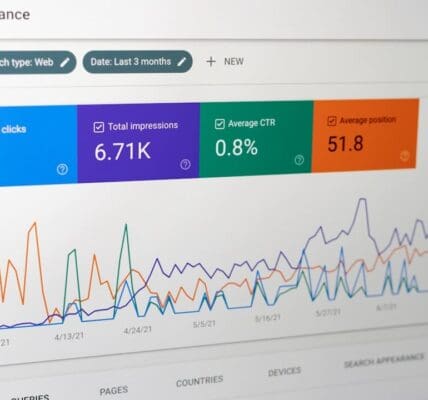Search Engine Optimization (SEO) is the process of optimizing a website to improve its visibility and ranking on search engine results pages (SERPs). The goal of SEO is to drive organic traffic to a website by increasing its visibility for relevant search queries. Google Analytics is a powerful tool that provides valuable insights into website traffic and user behavior. It allows website owners to track and analyze various metrics, such as traffic sources, user demographics, and user engagement. By understanding the basics of SEO and Google Analytics, website owners can make informed decisions to improve their website’s performance and visibility in search engine results.
SEO involves various strategies and techniques, including keyword research, on-page optimization, link building, and content creation. These strategies aim to improve a website’s relevance and authority in the eyes of search engines like Google. Google Analytics plays a crucial role in monitoring the effectiveness of these SEO efforts. It provides data on organic search traffic, keyword performance, and user engagement, allowing website owners to assess the impact of their SEO strategies. By understanding how SEO and Google Analytics work together, website owners can gain valuable insights into their website’s performance and make data-driven decisions to improve their SEO efforts.
Key Takeaways
- SEO is the process of optimizing your website to rank higher in search engine results, while Google Analytics is a tool that helps track and analyze website traffic.
- Setting up Google Analytics for SEO tracking involves creating an account, adding tracking code to your website, and setting up goals and filters to monitor SEO performance.
- Google Analytics can be used to identify SEO opportunities by analyzing organic search traffic, user behavior, and conversion rates to understand what is working and what needs improvement.
- Analyzing keyword performance with Google Analytics involves tracking keyword rankings, organic search traffic, and user engagement to determine the effectiveness of your SEO efforts.
- Tracking and measuring SEO success with Google Analytics involves monitoring key metrics such as organic traffic, keyword rankings, and conversion rates to evaluate the impact of your SEO strategy.
Setting Up Google Analytics for SEO Tracking
Setting up Google Analytics for SEO tracking is essential for monitoring the performance of a website’s organic search traffic. The first step is to create a Google Analytics account and install the tracking code on the website. This code allows Google Analytics to collect data on website traffic and user behavior. Once the tracking code is installed, website owners can set up goals and filters to track specific SEO metrics, such as organic search traffic, keyword performance, and conversion rates. By customizing Google Analytics settings for SEO tracking, website owners can gain valuable insights into the effectiveness of their SEO efforts.
In addition to setting up basic tracking, website owners can also use Google Analytics to monitor specific SEO metrics, such as organic search traffic, keyword rankings, and backlink performance. By creating custom reports and dashboards, website owners can track these metrics over time and identify trends and patterns in their website’s organic search performance. Setting up Google Analytics for SEO tracking allows website owners to gain a deeper understanding of their website’s organic search performance and make informed decisions to improve their SEO strategies.
Utilizing Google Analytics to Identify SEO Opportunities
Google Analytics provides valuable insights into website traffic and user behavior, which can be used to identify SEO opportunities. By analyzing data on organic search traffic, user demographics, and user engagement, website owners can identify areas for improvement in their SEO strategies. For example, if Google Analytics shows that a website is receiving a high bounce rate from organic search traffic, it may indicate that the website’s content or user experience needs improvement. By identifying these opportunities for improvement, website owners can make informed decisions to optimize their website for better organic search performance.
In addition to analyzing user behavior, website owners can also use Google Analytics to identify opportunities for keyword targeting and content creation. By analyzing data on top-performing keywords and landing pages, website owners can identify gaps in their content strategy and create new content to target relevant keywords. Google Analytics also provides data on user search queries, which can be used to identify new keyword opportunities for content creation. By utilizing Google Analytics to identify SEO opportunities, website owners can optimize their website for better organic search visibility and drive more targeted traffic to their site.
Analyzing Keyword Performance with Google Analytics
| Keyword | Clicks | Impressions | CTR | Average Position |
|---|---|---|---|---|
| keyword1 | 100 | 1000 | 10% | 3.5 |
| keyword2 | 80 | 900 | 8.9% | 4.2 |
| keyword3 | 120 | 1100 | 10.9% | 2.8 |
Analyzing keyword performance is essential for optimizing a website’s organic search visibility. Google Analytics provides valuable data on keyword performance, including metrics such as organic search traffic, bounce rate, and conversion rate for specific keywords. By analyzing this data, website owners can identify top-performing keywords that drive the most relevant traffic to their site. They can also identify low-performing keywords that may need optimization or replacement with more relevant terms. By analyzing keyword performance with Google Analytics, website owners can make informed decisions to improve their website’s keyword targeting and drive more targeted organic search traffic.
In addition to analyzing keyword performance, website owners can also use Google Analytics to track the effectiveness of their content strategy for specific keywords. By analyzing data on landing pages and user engagement for specific keywords, website owners can assess the impact of their content on organic search performance. They can identify top-performing landing pages and optimize underperforming pages to improve their organic search visibility. By utilizing Google Analytics to analyze keyword performance, website owners can gain valuable insights into their website’s keyword targeting and make data-driven decisions to improve their organic search performance.
Tracking and Measuring SEO Success with Google Analytics
Tracking and measuring SEO success is essential for assessing the effectiveness of a website’s SEO strategies. Google Analytics provides valuable data on various SEO metrics, such as organic search traffic, keyword performance, and user engagement. By tracking these metrics over time, website owners can assess the impact of their SEO efforts and make informed decisions to improve their organic search performance. For example, by tracking changes in organic search traffic and keyword rankings, website owners can assess the effectiveness of their on-page optimization and content strategy. They can also track changes in user engagement metrics, such as bounce rate and time on page, to assess the impact of their user experience optimization efforts.
In addition to tracking basic SEO metrics, website owners can also use Google Analytics to measure the impact of their SEO efforts on business goals, such as lead generation and e-commerce sales. By setting up goals and e-commerce tracking in Google Analytics, website owners can track conversions from organic search traffic and assess the ROI of their SEO efforts. They can also use multi-channel funnels in Google Analytics to assess the impact of organic search traffic on overall conversion paths. By tracking and measuring SEO success with Google Analytics, website owners can gain valuable insights into the effectiveness of their SEO strategies and make data-driven decisions to improve their organic search performance.
Using Google Analytics to Monitor and Improve Site Speed for SEO

Site speed is a crucial factor in determining a website’s organic search visibility and user experience. Slow-loading websites are less likely to rank well in search engine results and are more likely to have high bounce rates. Google Analytics provides valuable data on site speed metrics, such as page load time and server response time, which can be used to monitor and improve a website’s site speed for better SEO performance. By analyzing site speed data in Google Analytics, website owners can identify areas for improvement in their website’s performance and make informed decisions to optimize their site speed for better organic search visibility.
In addition to monitoring site speed metrics, website owners can also use Google Analytics to identify specific pages that may be impacting site speed and user experience. By analyzing data on page load time and bounce rate for specific pages, website owners can identify pages that may need optimization for better site speed performance. They can optimize images, minify CSS and JavaScript files, and leverage browser caching to improve the performance of these pages. By using Google Analytics to monitor and improve site speed for SEO, website owners can optimize their website for better organic search visibility and provide a better user experience for their visitors.
Leveraging Google Analytics to Enhance Mobile SEO Strategy
Mobile optimization is essential for improving a website’s organic search visibility, as more users are accessing websites from mobile devices than ever before. Google Analytics provides valuable data on mobile traffic metrics, such as mobile bounce rate, mobile conversion rate, and mobile user engagement, which can be used to assess a website’s mobile SEO performance. By analyzing mobile traffic data in Google Analytics, website owners can identify areas for improvement in their mobile SEO strategy and make informed decisions to optimize their website for better mobile organic search visibility.
In addition to analyzing mobile traffic metrics, website owners can also use Google Analytics to identify specific mobile devices and browsers that may be impacting mobile user experience. By analyzing data on device and browser usage for mobile traffic, website owners can identify devices and browsers that may need optimization for better mobile performance. They can optimize their website’s design and functionality for specific devices and browsers to provide a better user experience for mobile visitors. By leveraging Google Analytics to enhance their mobile SEO strategy, website owners can optimize their website for better organic search visibility on mobile devices and drive more targeted traffic to their site.
In conclusion, understanding the basics of SEO and Google Analytics is essential for improving a website’s organic search visibility and driving targeted traffic. By setting up Google Analytics for SEO tracking, utilizing it to identify SEO opportunities, analyzing keyword performance, tracking and measuring SEO success, monitoring and improving site speed for SEO, and leveraging it to enhance mobile SEO strategy, website owners can gain valuable insights into their website’s performance and make informed decisions to improve their SEO efforts. With the right strategies in place, website owners can optimize their websites for better organic search visibility and drive more targeted traffic from search engines like Google.
FAQs
What is search engine optimization (SEO)?
Search engine optimization (SEO) is the process of improving a website’s visibility in search engine results. This is done through various strategies and techniques to increase the website’s organic (non-paid) traffic.
What is Google Analytics?
Google Analytics is a web analytics service offered by Google that tracks and reports website traffic. It provides valuable insights into the behavior of website visitors, helping website owners understand their audience and optimize their online presence.
How does SEO relate to Google Analytics?
SEO and Google Analytics are closely related as they both focus on improving a website’s performance and visibility. Google Analytics provides data on website traffic, user behavior, and conversions, which can be used to inform and measure the effectiveness of SEO strategies.
What are some key metrics in Google Analytics for SEO?
Some key metrics in Google Analytics for SEO include organic traffic, bounce rate, average session duration, pages per session, and conversion rate. These metrics help website owners understand how users are interacting with their site and can be used to identify areas for improvement in SEO efforts.
How can Google Analytics help with SEO strategy?
Google Analytics can help with SEO strategy by providing valuable data on website performance, user behavior, and the effectiveness of SEO efforts. This data can be used to identify strengths and weaknesses, track progress, and make informed decisions to improve the website’s visibility and performance in search engine results.












